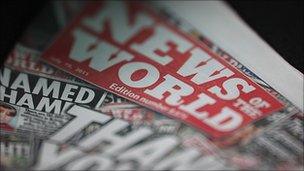Q&A: Press regulation
- Published

Press regulation faced intense scrutiny in the wake of phone hacking at the News of the World
Politicians and the press have been at odds over the details of a royal charter to underpin a new system of industry self-regulation in England and Wales in the wake of the Leveson inquiry.
In March, the main political party leaders, David Cameron, Nick Clegg and Ed Miliband, agreed to set up a new watchdog by royal charter, with powers to impose million-pound fines on UK publishers and demand upfront apologies from them.
The newspapers said some of the recommendations were unworkable and gave politicians an "unacceptable degree of interference".
They submitted a rival royal charter proposal which has been rejected by the Privy Council - the body that formally advises the Queen.
A final version of the government's royal charter was published on 11 October and approved by the Privy Council on 30 October.
How did the issue of press regulation come to be discussed?
What were Leveson's key recommendations?
What happened next?
What did the press have to say about all of this?
What next?

New press regulator: Proposals compared

Political involvement:
Government: Royal Charter could be amended by Parliament, but only if there was a two-thirds majority in both houses
Newspapers: Parliament could not block or approve any future changes to regulation. Instead the regulator, trade bodies and the regulator's panel would have to agree to changes
"Recognition" panel:
Government: Former editors would be banned from serving on the "recognition panel", which would decide whether newspapers were being regulated properly
Newspapers: Former editors would be allowed to serve and there would be a requirement for at least one member to have newspaper industry experience
Appointments process:
Government: Appointments committee to consist of no fewer than four members and no more than eight, none of whom could be a serving editor or MP
Newspapers: Want one of the members to "represent the interests of relevant publishers"
Corrections and apologies:
Government: Regulator to have the power to demand prominent corrections and apologies from publishers and impose £1m fines. Regulator board would "direct" the nature, extent and placement of corrections
Newspapers: Regulator to have the power to ensure "up-front corrections, with inaccuracies corrected fully and prominently" and to impose £1m fines for "systematic wrongdoing". However, the board would "require" rather than "direct" in relation to apologies
Arbitration:
Government: A small administration fee for complainants to be decided by the regulator and approved by the "recognition panel", and a fast complaints system would be established to ensure all individuals could afford to pursue action against publishers. Local and regional press can opt out if they can prove it causes "serious financial harm".
Newspapers: An arbitration service would offer "a speedy and inexpensive alternative to the libel courts, subject to the successful conclusion of a pilot scheme". Papers had been concerned a free service could lead to a surge of claims for damages

- Published5 December 2012